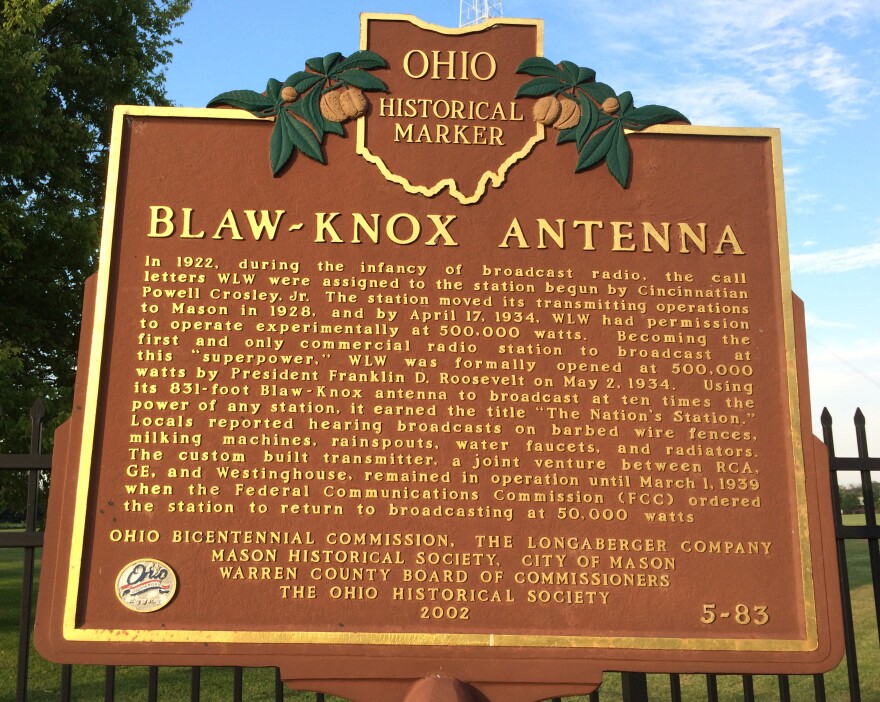WLW-AM's iconic diamond-shaped radio tower and historic transmitter building on Tylersville Road soon will be casting their shadows on retail stores, restaurants and offices beneath it.
The "Tower Park" planned unit development along Mason's booming Tylersville Road corridor was approved by city council earlier this year, a city staffer tells me.

The diamond-shaped Blaw-Knox tower, only one of six still used today by U.S. radio stations, will remain in operation. Apparently remaining will be the red brick building which housed the 1934 one-of-a-kind 500,000-watt transmitter; the brick residence for WLW-AM's chief engineer; a guard tower; and a second antenna west of the transmitter building.
The 26.7-acre concept plan approved by council calls for four restaurants, five office buildings, a small retail building, a mini-warehouse, 700 parking spaces and a loop service road with a roundabout.
Some of the parking spaces and buildings are under the tensioned guy wires, cables supporting the 747-foot 831-foot WLW-AM tower, which could drop icicles after a winter storm. (I bet anyone who ever parked under the WKRC-TV and WLWT-TV towers won't park under that tower after a winter storm!)
Michael Bergman, of NAI Bergman, says the site developer did not want to comment at this time. Bergman said that his client believes that "discussion now would be premature."

The WLW-AM tower definitely is "The Big One." Workers connected two pyramid-shaped radio towers to make the 831-foot structure with flagpole (since removed). It is 35-feet wide in the middle at the WLW call letters, but only 30 inches wide at the base, which rests on a ceramic insulator.

Crosley literature in the 1930s boasted that the 135-ton tower was taller than the Washington Monument (558 feet) and Cincinnati's 49-story Carew Tower (574 feet). It's also taller than the 41-story Great American Tower at Queen City Square (660 feet).
WLW-AM founder Powel Crosley moved his transmitter from Harrison to Tylersville Road in 1928. After Crosley was granted experimental "super power" by the federal government, President Franklin D. Roosevelt activated the 500,000-watt transmitter on May 2, 1934 from the White House. With a signal 10 times more powerful than any other U.S. broadcaster, "The Nation's Station" beamed programs coast to coast (and beyond) for five years. After 1939, WLW-AM continued to use "super power" midnight-2 a.m. until 1943.
An Ohio Historical marker was erected at the transmitter site entrance, 710 Tylersville Road, notes that local residents "reported hearing (WLW) broadcasts on barbed-wire fences, milking machines, rain spouts, water faucets and radiators."

The custom-built 500,000-watt transmitter was a joint venture between RCA, General Electric and Westinghouse, the sign says. The transmitter was 54-feet wide, 13-feet tall and 7-feet deep. It used 22 glass radio tubes -- each 5-feet high – cooled by 700 gallons of distilled water per minute circulating from a nearby pond.
In recent years, debt-plagued iHeartMedia (formerly Clear Channel) sold the Mason tower property to Vertical Bridge Holdings of Boca Raton, Fla., the nation's largest private owner and manager of communication infrastructure. Vertical Bridge leases towers, rooftops, billboards, utility attachments and other assets to telecommunications carriers or other users of wireless technology.
Crosley's "Everybody's Farm" – a farmhouse and working farm used for agricultural programming for rural listeners – was once located across from the tower property. It has been parceled off for retail.
Crosley engineers also built the Voice of America relay station and antennae west of the WLW-AM property on Tylersville Road, now a museum, park and bustling retail area.





